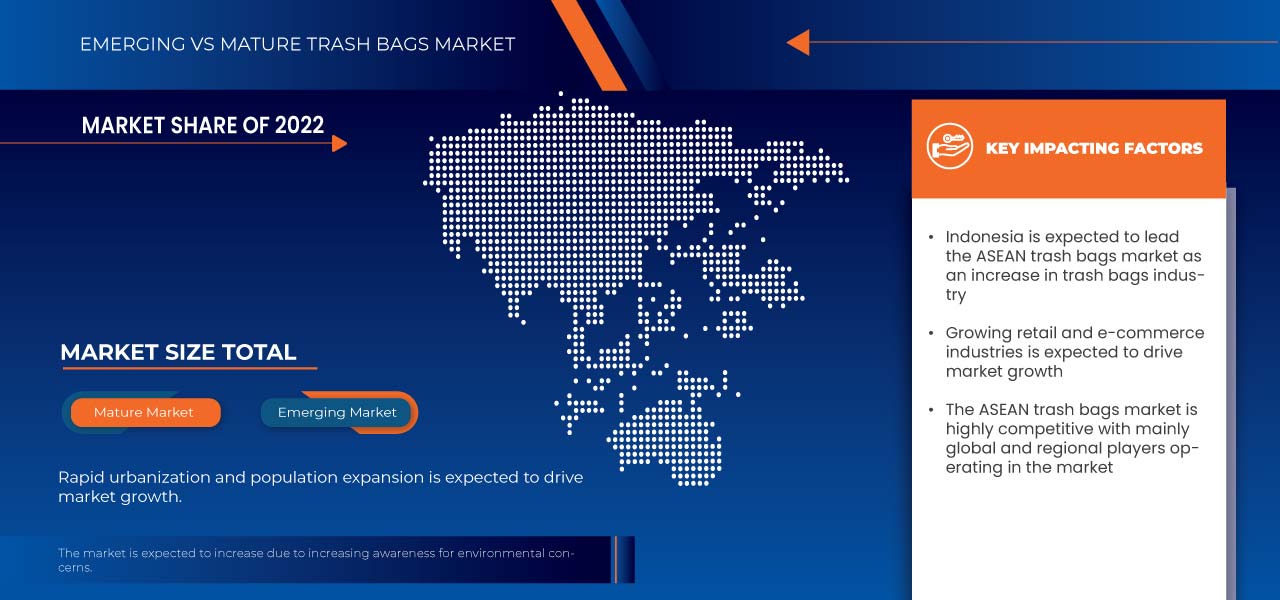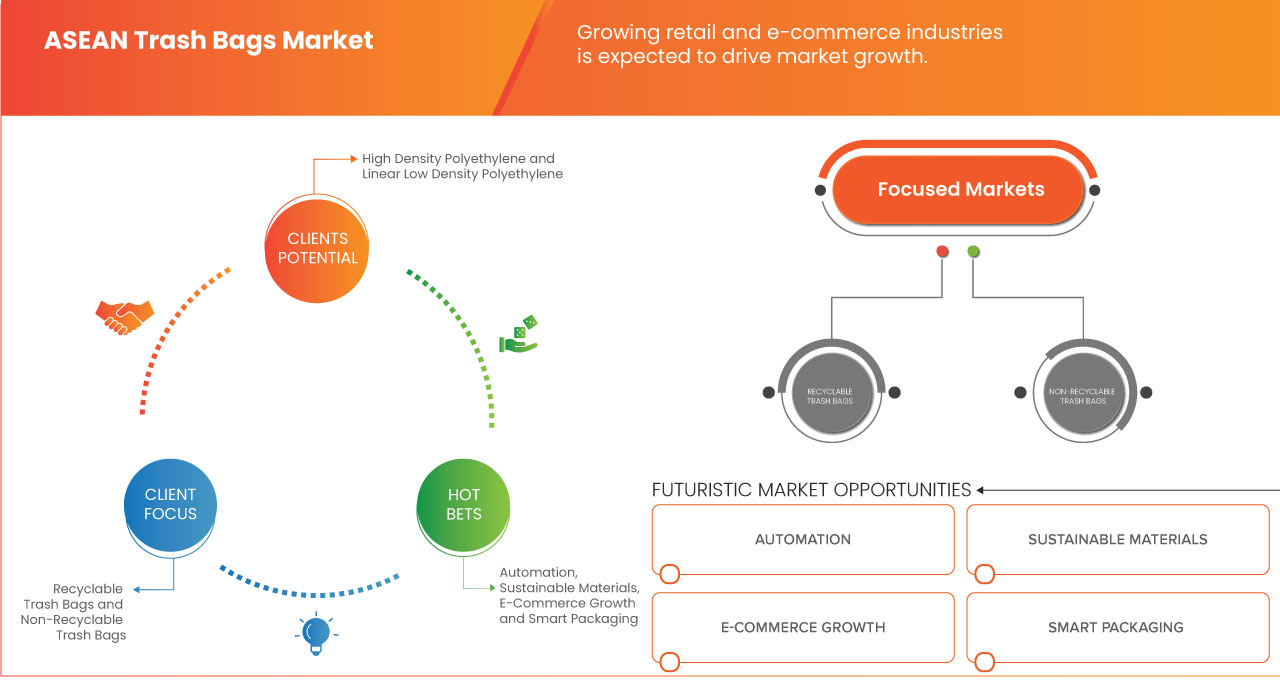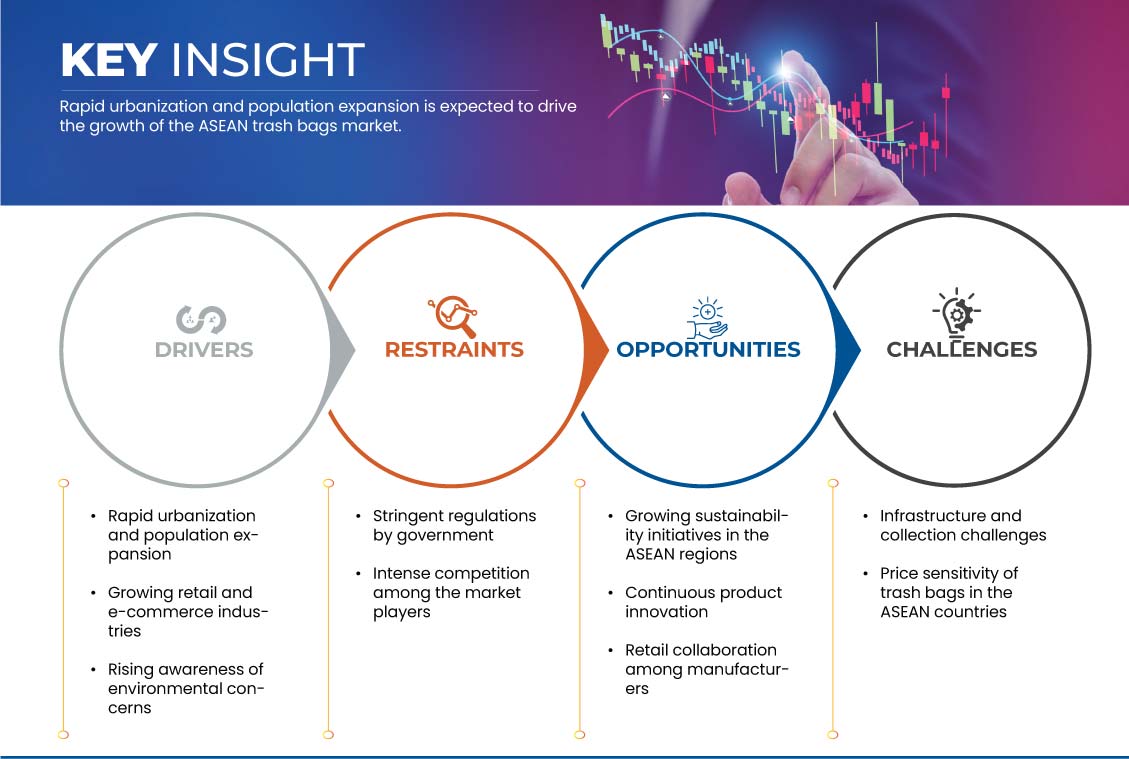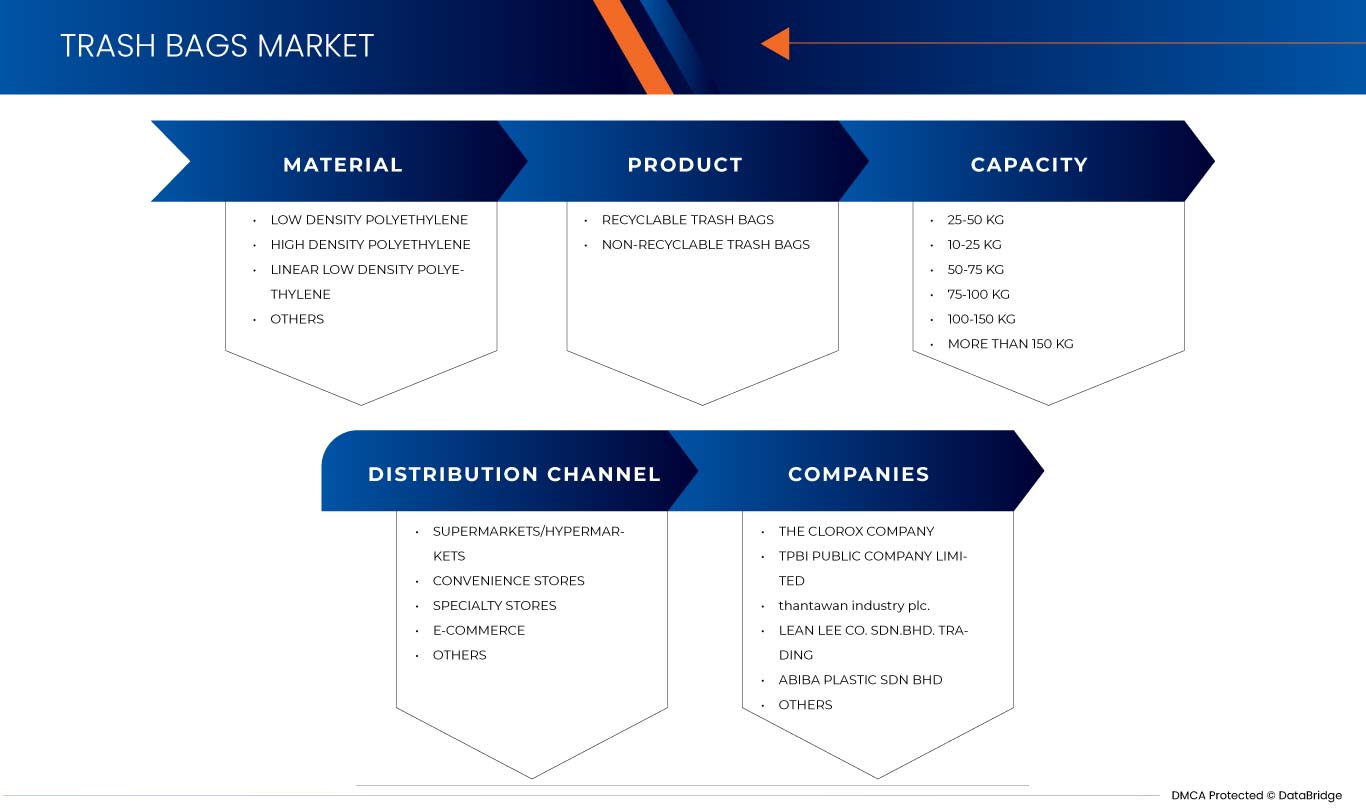ASEAN Trash Bags Market Analysis and Size
Rapid urbanization and population expansion, growing retail and e-commerce industries, and increasing awareness on environmental concerns are some of the driving factors expected to propel the market growth. Some of the major restraints that may negatively impact the market growth are stringent regulations for trash bags and intense competition in the market.
Growing sustainability initiatives in ASEAN regions and continuous product innovation is expected to provide opportunities for market growth. However, infrastructure and Collection Challenges is projected to challenge the market growth.
The ASEAN trash bags market is expected to grow significantly in the forecast period of 2023 to 2030. Data Bridge Market Research analyses that the market is growing with a CAGR of 3.4% in the forecast period of 2023 to 2030 and is expected to reach USD 1,133,103.30 thousand by 2030. The major factor driving the growth of the trash bags market is the rapid urbanization and population expansion, and growing retail and e-commerce industries.
|
Report Metric |
Details |
|
Forecast Period |
2023 to 2030 |
|
Base Year |
2022 |
|
Historic Years |
2021 (Customizable to 2015-2020) |
|
Quantitative Units |
Revenue in USD Thousand |
|
Segments Covered |
Material (Low Density Polyethylene, High Density Polyethylene, Linear Low Density Polyethylene, and Others), Product (Recyclable Trash Bags, Non-Recyclable Trash Bags), Capacity (25-50 Kg, 10-25 Kg, 50-75 Kg, 75-100 Kg, 100-150 Kg, and More than 150 Kg), Distribution Channel (Supermarkets/Hypermarkets, Convenience Stores, Specialty Stores, E-Commerce, and Others) |
|
Countries Covered |
Indonesia, Thailand, Vietnam, Philippines, Malaysia, Singapore, Myanmar, Cambodia, Laos, and Brunei |
|
Market Players Covered |
The Clorox Company, TPBI Public Company Limited, THANTAWAN INDUSTRY PLC., Lean Lee Trading Co. Sdn.Bhd., Abiba Plastic Sdn Bhd, Award Packaging Industries Sdn Bhd, NARAIPAK CO., LTD., Teong Chuan Plastic (M) Sdn Bhd, King Pac Industrial Co.,Ltd., PT. Indojaya Plasindo Makmur, PT. Sanipak Indonesia, LTD., Vn Plastic Co., Ltd, Ecolex, Vietnam Packing, Sahachit Watana Plastic Industry Co.,Ltd, Pikulthong Plastic Co.,Ltd., Cyclepoly Sdn Bhd, Urban Plastic, PT. KEMILAU INDAH PERMANA, and Robton Industries Inc. |
Market Definition
A trash bag, also known as a bin bag, rubbish bag, garbage bag, bin liner, trash bag, or refuse sack, is a disposable bag used to hold solid waste. Trash bags are mainly used to avoid solid and liquid waste spills and leaks. These bags are used for lining the insides of garbage receptacles to prevent waste material from coating the insides of the receptacle.
ASEAN Trash Bags Market Dynamics
This section deals with understanding the market drivers, advantages, opportunities, restraints, and challenges. All of this is discussed in detail below:
Drivers
- Rapid Urbanization and Population Expansion
Rapid urbanization and population growth are powerful drivers propelling the demand for trash bags in the ASEAN region. These intertwined demographic trends have ushered in transformative changes across the region, reshaping landscapes, lifestyles, and waste generation patterns. The imperative for effective waste management has grown exponentially, underpinning the rising need for trash bags in various sectors, including households, commercial establishments, and municipal waste management as urban areas expand and populations burgeon.
Urbanization, the migration of populations from rural to urban areas, lies at the heart of this transformative shift. In the ASEAN region, urbanization is occurring at an accelerated pace, driven by multiple factors. Cities are seen as hubs of economic opportunity, offering better employment prospects, access to education, healthcare services, and improved living standards. As a result, a significant portion of the population is relocating from rural villages to burgeoning urban centers.
The ASEAN region's rapid urbanization and population increase are significant factors boosting trash bag demand. Trash bags are becoming an essential part of contemporary garbage management techniques as a result of these demographic upheavals, which have ushered in a new era of waste generation. Trash bags play a critical role in tackling the problems caused by urbanization and population expansion by promoting cleanliness, hygiene, and the effective collection and disposal of waste in homes, businesses, and municipalities. The demand for trash bags is expected to stay strong as long as these trends continue, highlighting their crucial role in supporting sustainable waste management practices throughout the region. Thus, rapid urbanization and population expansion are expected to drive market growth.
- Growing Retail and E-Commerce Industries
The ASEAN region is experiencing a significant surge in the demand for trash bags, driven by the rapid growth of the retail and e-commerce industries. This expansion has catalyzed the adoption of trash bags for packaging and the disposal of products, particularly in the e-commerce sector, where concerns about packaging waste are on the rise. E-commerce has witnessed exponential growth in the ASEAN region, fueled by factors such as increased internet penetration, rising consumer confidence in online shopping, and the convenience it offers. There has been a proportional uptick in the need for efficient and sustainable packaging solutions. This is where trash bags come into play as more consumers turn to online platforms to purchase a wide array of products.
The expansion of the retail and e-commerce industries in the ASEAN region has significantly bolstered the demand for trash bags. These versatile bags are not only essential for packaging and waste disposal but also play a crucial role in addressing the packaging waste challenges associated with the e-commerce sector. Trash bags represent a sustainable solution that meets the packaging needs of businesses while promoting responsible waste management practices as environmental concerns continue to grow. In this evolving landscape, trash bags have become an indispensable component of the ASEAN waste management ecosystem. Thus, the growing retail and e-commerce industries are expected to drive market growth.
- Rising Awareness of Environmental Concerns
The ASEAN region has seen a striking change in consumer behavior and governmental legislation, mostly brought about by a surge in environmental awareness. This growing environmental awareness has been a significant market driver for garbage bags in ASEAN, driving up demand for environmentally friendly and biodegradable waste bags. The garbage bag industry is witnessing a revolutionary transition as governments and consumers alike emphasize sustainable waste management solutions.
One of the most profound changes sweeping across the ASEAN region is the heightened awareness of environmental challenges. Citizens are increasingly attuned to the ecological consequences of their daily choices, spanning from product purchases to waste disposal. This awakening has manifested as a growing preference for eco-friendly and sustainable alternatives, including trash bags.
An important market driver for ASEAN trash bags is the growing awareness of environmental issues. They are gravitating towards eco-friendly and biodegradable trash bags as more consumers link their purchasing decisions with sustainable ideals. Government rules, business sustainability pledges, market innovation, and educational outreach are all factors in the soaring demand for eco-friendly waste bags. Manufacturers of garbage bags are adapting to this changing environment by coming up with creative solutions that not only excel at containing waste but also promise an ASEAN area with a better and more sustainable future. The market expansion is anticipated to be fueled by rising environmental awareness.
Opportunities
- Growing Sustainability Initiatives in the ASEAN Regions
The market for garbage bags in the ASEAN region is poised for change and expansion, propelled by the escalating number of sustainability programs and a growing focus on environmental responsibility. Manufacturers have a lot of options in this changing market to create and sell eco-friendly waste bags that are in line with the shifting expectations of consumers in the ASEAN region.
The shifting customer preferences are one of the key factors driving this opportunity. The public's awareness of environmental problems and the damaging effects of non-biodegradable plastics on the environment has significantly increased. Customers are consequently actively looking for sustainable and eco-friendly alternatives to items. Trash bags made of biodegradable or compostable materials have grown increasingly popular with consumers becoming more aware of the impact of their purchases. This change in customer preferences gives manufacturers a significant opportunity to offer and advertise eco-conscious waste bag solutions.
- Continuous Product Innovation
The ASEAN trash bags market is poised for growth driven by product innovation, with a focus on creating cost-effective and eco-friendly solutions. This opportunity is fueled by shifting consumer expectations, the need for affordability, and advancements in materials and manufacturing processes.
Consumers in the ASEAN region are increasingly environmentally conscious, seeking trash bags that align with sustainability values. This demand has created a favorable environment for innovation. Manufacturers can capitalize on this trend by developing eco-friendly trash bags that address both sustainability concerns and budget constraints. Achieving cost-effectiveness while maintaining quality and sustainability standards is key.
Restraints/Challenges
- Stringent Regulations by Government
Regulatory restrictions on the ASEAN waste bag business have become a significant obstacle to expansion and innovation. The future of the sector is questionable due to strict laws and contradictory policies, notably those relating to the use of non-biodegradable plastics.
The ASEAN region has a complicated regulatory environment that affects how waste bags are made, distributed, and used. While some nations have put forward-thinking measures in place to reduce plastic pollution and encourage sustainable alternatives, others lag, retaining loose restrictions that favor conventional plastics.
Several ASEAN countries have taken bold steps to address the issue of plastic waste by imposing stringent bans and restrictions on the usage of non-biodegradable plastics. For instance, Thailand implemented a ban on single-use plastic bags in major retail stores and markets to reduce plastic pollution in 2020. This move aimed to encourage the adoption of eco-friendly alternatives such as biodegradable trash bags. They also create challenges for manufacturers and consumers while such bans align with environmental objectives.
- Price Sensitivity of Trash Bags in the ASEAN Countries
Consumer price sensitivity is a key challenge for the ASEAN waste bag business. Cost-effectiveness is of the utmost importance, frequently taking precedence over other factors for consumers in this area. Due to the current state of the economy, many people and households are forced to live on tight budgets. As a result, a large portion of the consumer population chooses ordinary, less expensive plastic bags over eco-friendly alternatives when given the choice.
Manufacturers of eco-friendly or high-quality waste bags face a difficult challenge in balancing affordability and sustainability. Their manufacturing procedures and materials might increase production costs while these products have higher environmental benefits such as biodegradability or composability. This cost disparity is a big barrier, especially when targeting price-sensitive customers.
ASEAN Trash Bags Market Scope
The ASEAN trash bags market is categorized based on material, product, capacity, and distribution channel. The growth amongst these segments will help you analyze major growth segments in the industries and provide the users with a valuable market overview and market insights to make strategic decisions to identify core market applications.
Material
- Low Density Polyethylene
- High Density Polyethylene
- Linear Low Density Polyethylene
- Others
On the basis of material, the ASEAN trash bags market is classified into low density polyethylene, high density polyethylene, linear low density polyethylene, and others.
Product
- Recyclable Trash Bags
- Non-Recyclable Trash Bags
On the basis of product, the ASEAN trash bags market is classified into recyclable trash bags and non-recyclable trash bags.
Capacity
- 25-50 Kg
- 10-25 Kg
- 50-75 Kg
- 75-100 Kg
- 100-150 Kg
- More than 150 Kg
On the basis of capacity, the ASEAN trash bags market is classified into 25-50 kg, 10-25 kg, 50-75 kg, 75-100 kg, 100-150 kg, and more than 150 kg.
Distribution Channel
- Supermarkets/Hypermarkets
- Convenience Stores
- Specialty Stores
- E-Commerce
- Others
On the basis of distribution channel, the ASEAN trash bags market is classified into supermarkets/hypermarkets, convenience stores, specialty stores, e-commerce, others.
ASEAN Trash Bags Market Regional Analysis/Insights
The ASEAN trash bags market is segmented on the basis of on material, product, capacity, and distribution channel.
The countries covered in the ASEAN trash bags market are the Indonesia, Thailand, Vietnam, Philippines, Malaysia, Singapore, Myanmar, Cambodia, Laos, and Brunei.
Indonesia is dominating the ASEAN trash bags market in terms of market share and market revenue due to rapid urbanization and population expansion in the region.
The country section of the report also provides individual market-impacting factors and changes in market regulation that impact the current and future trends of the market. Data point downstream and upstream value chain analysis, technical trends porter's five forces analysis, and case studies are some of the pointers used to forecast the market scenario for individual countries. Also, the presence and availability of ASEAN brands and their challenges faced due to large or scarce competition from local and domestic brands, the impact of domestic tariffs, and trade routes are considered while providing forecast analysis of the country data.
Competitive Landscape and ASEAN Trash Bags Market Share Analysis
The ASEAN trash bags market competitive landscape provides details by competitors. Details included are company overview, company financials, revenue generated, market potential, investment in research and development, new market initiatives, production sites and facilities, company strengths and weaknesses, product launch, product trials pipelines, product approvals, patents, product width and breadth, application dominance, technology lifeline curve. The above data points provided are only related to the companies’ focus related to the ASEAN trash bags market.
Some of the prominent participants operating in the ASEAN trash bags market are The Clorox Company, TPBI Public Company Limited, THANTAWAN INDUSTRY PLC., Lean Lee Trading Co. Sdn.Bhd., Abiba Plastic Sdn Bhd, Award Packaging Industries Sdn Bhd, NARAIPAK CO., LTD., Teong Chuan Plastic (M) Sdn Bhd, King Pac Industrial Co.,Ltd., PT. Indojaya Plasindo Makmur, PT. Sanipak Indonesia, LTD., Vn Plastic Co., Ltd, Ecolex, Vietnam Packing, Sahachit Watana Plastic Industry Co.,Ltd, Pikulthong Plastic Co.,Ltd., Cyclepoly Sdn Bhd, Urban Plastic, PT. KEMILAU INDAH PERMANA, and Robton Industries Inc., among others.
SKU-
Get online access to the report on the World's First Market Intelligence Cloud
- Interactive Data Analysis Dashboard
- Company Analysis Dashboard for high growth potential opportunities
- Research Analyst Access for customization & queries
- Competitor Analysis with Interactive dashboard
- Latest News, Updates & Trend analysis
- Harness the Power of Benchmark Analysis for Comprehensive Competitor Tracking
Table of Content
1 INTRODUCTION
1.1 OBJECTIVES OF THE STUDY
1.2 MARKET DEFINITION
1.3 OVERVIEW
1.4 LIMITATIONS
1.5 MARKETS COVERED
2 MARKET SEGMENTATION
2.1 MARKETS COVERED
2.2 GEOGRAPHICAL SCOPE
2.3 YEARS CONSIDERED FOR THE STUDY
2.4 CURRENCY AND PRICING
2.5 DBMR TRIPOD DATA VALIDATION MODEL
2.6 MULTIVARIATE MODELING
2.7 PRIMARY INTERVIEWS WITH KEY OPINION LEADERS
2.8 DBMR MARKET POSITION GRID
2.9 DBMR VENDOR SHARE ANALYSIS
2.1 SECONDARY SOURCES
2.11 ASSUMPTIONS
3 EXECUTIVE SUMMARY
4 PREMIUM INSIGHTS
4.1 RAW MATERIAL COVERAGE
4.2 LOGISTICS COST COVERAGE
4.3 IMPORT-EXPORT SCENARIO
5 MARKET OVERVIEW
5.1 DRIVERS
5.1.1 RAPID URBANIZATION AND POPULATION EXPANSION
5.1.2 GROWING RETAIL AND E-COMMERCE INDUSTRIES
5.1.3 RISING AWARENESS OF ENVIRONMENTAL CONCERNS
5.2 RESTRAINTS
5.2.1 STRINGENT REGULATIONS BY GOVERNMENT
5.2.2 INTENSE COMPETITION AMONG THE MARKET PLAYERS
5.3 OPPORTUNITIES
5.3.1 GROWING SUSTAINABILITY INITIATIVES IN THE ASEAN REGIONS
5.3.2 CONTINUOUS PRODUCT INNOVATION
5.3.3 RETAIL COLLABORATION AMONG MANUFACTURERS
5.4 CHALLENGES
5.4.1 INFRASTRUCTURE AND COLLECTION CHALLENGES
5.4.2 PRICE SENSITIVITY OF TRASH BAGS IN THE ASEAN COUNTRIES
6 ASEAN TRASH BAGS MARKET: BY COUNTRY
7 ASEAN TRASH BAGS MARKET: COMPANY LANDSCAPE
7.1 COMPANY SHARE ANALYSIS: GLOBAL
7.2 COMPANY SHARE ANALYSIS: ASEAN
7.3 COMPANY SHARE ANALYSIS: MALAYSIA
8 COMPANY PROFILES
8.1 LEAN LEE TRADING CO. SDN.BHD.
8.1.1 COMPANY SNAPSHOT
8.1.2 PRODUCT PORTFOLIO
8.1.3 RECENT DEVELOPMENT
8.2 AWARD PACKAGING INDUSTRIES SDN BHD
8.2.1 COMPANY SNAPSHOT
8.2.2 PRODUCT PORTFOLIO
8.2.3 RECENT DEVELOPMENT
8.3 TEONG CHUAN PLASTIC (M) SDN BHD
8.3.1 COMPANY SNAPSHOT
8.3.2 PRODUCT PORTFOLIO
8.3.3 RECENT DEVELOPMENT
8.4 CYCLEPOLY SDN BHD
8.4.1 COMPANY SNAPSHOT
8.4.2 PRODUCT PORTFOLIO
8.4.3 RECENT DEVELOPMENT
9 QUESTIONNAIRE
10 RELATED REPORTS
List of Figure
FIGURE 1 ASEAN TRASH BAGS MARKET
FIGURE 2 ASEAN TRASH BAGS MARKET: DATA TRIANGULATION
FIGURE 3 ASEAN TRASH BAGS MARKET: DROC ANALYSIS
FIGURE 4 ASEAN TRASH BAGS MARKET: REGIONAL VS COUNTRY MARKET ANALYSIS
FIGURE 5 ASEAN TRASH BAGS MARKET: COMPANY RESEARCH ANALYSIS
FIGURE 6 ASEAN TRASH BAGS MARKET: MULTIVARIATE MODELLING
FIGURE 7 ASEAN TRASH BAGS MARKET: INTERVIEW DEMOGRAPHICS
FIGURE 8 ASEAN TRASH BAGS MARKET: DBMR MARKET POSITION GRID
FIGURE 9 ASEAN TRASH BAGS MARKET: VENDOR SHARE ANALYSIS
FIGURE 10 ASEAN TRASH BAGS MARKET: SEGMENTATION
FIGURE 11 RAPID URBANIZATION AND POPULATION EXPANSION IS EXPECTED TO DRIVE THE ASEAN TRASH BAGS MARKET IN THE FORECAST PERIOD
FIGURE 12 THE LOW DENSITY POLYETHYLENE IS EXPECTED TO ACCOUNT FOR THE LARGEST SHARE OF THE ASEAN TRASH BAGS MARKET IN 2023 AND 2030
FIGURE 13 IMPORT-EXPORT DATA (USD THOUSAND)
FIGURE 14 DRIVERS, RESTRAINTS, OPPORTUNITIES, AND CHALLENGES OF THE ASEAN TRASH BAGS MARKET
FIGURE 15 ASEAN TRASH BAGS MARKET: BY SNAPSHOT (2022)
FIGURE 16 GLOBAL TRASH BAGS MARKET: COMPANY SHARE 2022 (%)
FIGURE 17 ASEAN TRASH BAGS MARKET: COMPANY SHARE 2022 (%)
FIGURE 18 MALAYSIA TRASH BAGS MARKET: COMPANY SHARE 2022 (%)

Asean Trash Bags Market, Supply Chain Analysis and Ecosystem Framework
To support market growth and help clients navigate the impact of geopolitical shifts, DBMR has integrated in-depth supply chain analysis into its Asean Trash Bags Market research reports. This addition empowers clients to respond effectively to global changes affecting their industries. The supply chain analysis section includes detailed insights such as Asean Trash Bags Market consumption and production by country, price trend analysis, the impact of tariffs and geopolitical developments, and import and export trends by country and HSN code. It also highlights major suppliers with data on production capacity and company profiles, as well as key importers and exporters. In addition to research, DBMR offers specialized supply chain consulting services backed by over a decade of experience, providing solutions like supplier discovery, supplier risk assessment, price trend analysis, impact evaluation of inflation and trade route changes, and comprehensive market trend analysis.
Research Methodology
Data collection and base year analysis are done using data collection modules with large sample sizes. The stage includes obtaining market information or related data through various sources and strategies. It includes examining and planning all the data acquired from the past in advance. It likewise envelops the examination of information inconsistencies seen across different information sources. The market data is analysed and estimated using market statistical and coherent models. Also, market share analysis and key trend analysis are the major success factors in the market report. To know more, please request an analyst call or drop down your inquiry.
The key research methodology used by DBMR research team is data triangulation which involves data mining, analysis of the impact of data variables on the market and primary (industry expert) validation. Data models include Vendor Positioning Grid, Market Time Line Analysis, Market Overview and Guide, Company Positioning Grid, Patent Analysis, Pricing Analysis, Company Market Share Analysis, Standards of Measurement, Global versus Regional and Vendor Share Analysis. To know more about the research methodology, drop in an inquiry to speak to our industry experts.
Customization Available
Data Bridge Market Research is a leader in advanced formative research. We take pride in servicing our existing and new customers with data and analysis that match and suits their goal. The report can be customized to include price trend analysis of target brands understanding the market for additional countries (ask for the list of countries), clinical trial results data, literature review, refurbished market and product base analysis. Market analysis of target competitors can be analyzed from technology-based analysis to market portfolio strategies. We can add as many competitors that you require data about in the format and data style you are looking for. Our team of analysts can also provide you data in crude raw excel files pivot tables (Fact book) or can assist you in creating presentations from the data sets available in the report.
















